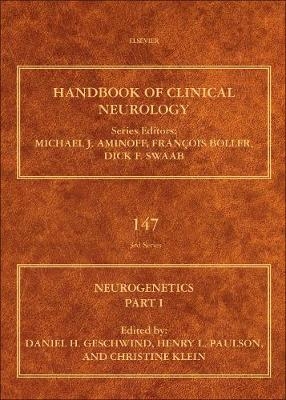
Neurogenetics, Part I
Elsevier Science Ltd (Verlag)
978-0-444-63233-3 (ISBN)
- Titel ist leider vergriffen;
keine Neuauflage - Artikel merken
Dr. Geschwind is the Gordon and Virginia MacDonald Distinguished Professor of Human Genetics, Neurology and Psychiatry at UCLA. In his capacity as Senior Associate Dean and Associate Vice Chancellor of Precision Health, he leads the Institute for Precision Health at UCLA. His laboratory has pioneered the application of systems biology methods in neurologic and psychiatric disease, describing multiple disease-causing genes and disease mechanisms in the book “Neurodevelopmental and Neurodegenerative Diseases. Dr. Geschwind has put considerable effort into fostering large-scale collaborative patient resources for genetic research and data sharing in autism research. He has served on numerous scientific advisory boards, including the Faculty of 1000 Medicine, the Executive Committee of the American Neurological Association, the Scientific Advisory Board for the Allen Institute for Brain Science, the NIMH Advisory Council and the NIH Council of Councils. He has published over 400 papers and serves on the editorial boards of Cell, Neuron and Science. He has received several awards for his laboratory’s work and leadership including the Ruane Prize from the Brain and Behavior Foundation in 2013 and the Derek Denny-Brown Neurological Scholar Award from the American Neurological Association (ANA) in 2004. He is an elected Member of the American Association of Physicians and the National Academy of Medicine. Dr. Henry Paulson is the Lucile Groff Professor of Neurology for Alzheimer’s Disease and Related Disorders in the Department of Neurology at the University of Michigan. Dr. Paulson joined the U-M faculty in 2007, where he directs the programs in neurodegenerative diseases, the Michigan Alzheimer’s Disease Center and co-directs the University of Michigan Protein Folding Diseases Initiative. Dr. Paulson received his MD and PhD from Yale University in 1990, then completed a neurology residency and neurogenetics/movement disorders fellowships at the University of Pennsylvania. From 1997 to 2007, he was on the Neurology faculty at the University of Iowa. Dr. Paulson’s research and clinical interests concern the causes and treatment of age-related neurodegenerative diseases, with a focus on hereditary ataxias, polyglutamine diseases, and frontotemporal dementia. Dr. Paulson serves on the scientific advisory boards of numerous disease-related national organizations, and is past-Chair of the Board of Scientific Counselors at the National Institute for Neurological Disorders and Stroke at the National Institutes of Health. Dr. Christine Klein is a Professor of Neurology and Neurogenetics. She studied medicine in Hamburg, Heidelberg, Luebeck (1988-1994), and London (with Dr. N.P. Quinn in 1994/1995). She moved to Boston from 1997-1999 for a fellowship in Molecular Neurogenetics under the mentorship of Dr. X.O. Breakefield. Dr. Klein completed her neurology training at Luebeck University with Dr. D. Koempf in 2004, followed by a series of summer sabbaticals in movement disorders with Dr. A.E. Lang in Toronto, Canada in 2004-2015. She was appointed Lichtenberg Professor at the Department of Neurology of Luebeck University in 2005, where her research has focused on the clinical and molecular genetics of movement disorders and its functional consequences. In 2009, Dr. Klein has been awarded a Schilling Section of Clinical and Molecular Neurogenetics at the University of Luebeck and has become Director of the newly founded Institute of Neurogenetics in 2013. Dr. Klein has published over 400 scientific papers and is the 2008 recipient of the Derek Denny-Brown Award of the American Neurological Association. She is an Associate Editor of ‘Annals of Neurology’ and of ‘Movement Disorders’. She has served as chair of the Congress Scientific Program Committee of the 2016/2017 Annual Congresses of the International Parkinson and Movement Disorder Society and is President-Elect of the German Neurological Society.
Section I. Basic Genetic Concepts1. Clinical approach to the patient with neurogenetic disease2. Genetic and genomic testing for neurological disease in clinical practice 3. Ethical issues in neurogenetics4. Evolving views of human genetic variation and its relationship to neurologic and psychiatric disease5. Epigenetic mechanisms underlying nervous system diseases6. Pharmacogenetics7. Bioinformatics and genomic databases8. Towards precision medicine
Section II. Recurring Biological Themes in Neurogenetics9. Repeat expansion diseases10. Mitochondrial diseases11. The CAG – polyglutamine repeat diseases: A clinical, molecular, genetic and pathophysiological nosology
Section III. Movement Disorders12. Autosomal dominant cerebellar ataxias13. Autosomal recessive cerebellar ataxias 14. Genetics of Parkinson disease15. Essential Tremor16. Inherited dystonias: Clinical features and molecular pathways17. Huntington’s Disease18. Wilson Disease and related copper disorders19. Neurodegeneration with brain iron accumulation (NBIA)20. Primary familial brain calcifications
Section IV. Neurodevelopmental Disorders21. Genetics of autism spectrum disorder22. The emerging genetic landscape of cerebral palsy23. Tourette disorder and other tic disorders24. Sex chromosome aneuploidies25. Fragile X syndrome and fragile X-associated tremor ataxia syndrome
| Reihe/Serie | Handbook of Clinical Neurology |
|---|---|
| Verlagsort | Oxford |
| Sprache | englisch |
| Maße | 184 x 260 mm |
| Gewicht | 1220 g |
| Themenwelt | Medizin / Pharmazie ► Medizinische Fachgebiete ► Neurologie |
| Studium ► 2. Studienabschnitt (Klinik) ► Humangenetik | |
| ISBN-10 | 0-444-63233-6 / 0444632336 |
| ISBN-13 | 978-0-444-63233-3 / 9780444632333 |
| Zustand | Neuware |
| Haben Sie eine Frage zum Produkt? |
aus dem Bereich


